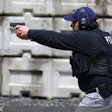It's a dangerous world. Nobody knows that more than cops. But another group of people know it, too: the rich and powerful.
The rich and powerful, celebrities, and corporate executives are potential targets both abroad and here in the United States. That's why executive protection is one of the world's fastest growing sources of employment for law enforcement officers and military veterans.
John Sexton, president of Sexton Executive Security, says that cops are good candidates for executive protection work because they are used to discipline and long hours. "Police and military are drawn to this kind of work," says Sexton who has more than 29 years of law enforcement and personal security experience both in international war zones and here in the States. "It's tough work, but it's exciting. No two days are ever the same."
Cops are drawn to personal security work as a part-time job or employment after retirement. However, Sexton says that just because they are great law enforcement officers that doesn't automatically make them great personal security professionals. They need special training so they can learn the differences between being a cop and being a personal security professional, he explains.
"It's a different mind-set," Sexton says. "Getting the person you are protecting, 'the principle,' to safety is the goal. Your whole focus and attention has to be getting the principle to safety. Police officers who haven't had dignitary protection training, tend to stand their ground, take cover behind the car, and shoot it out. They don't naturally think, 'Let's get this person out of harm's way.' That's why we don't use off-duty police officers for this kind of work unless they have been trained for it. It requires a different mind-set."
Sexton Executive Security offers its personal security training program at a variety of locations worldwide. In the U.S. classes are planned for Maryland, California, Nevada, and Florida in the coming year.
The courses are designed as something of a baptism of fire. For a week, the students take classroom instruction in such topics as threat assessment, ethics, physical combat, firearms combat, and law, just to name a few. They also experience a bit of the life of a personal security professional, sometimes working till dawn in practical training exercises. Afterward, they are expected to be in class and ready to learn a few hours later.
"That's the way it is on the job," says Sexton. "You fly with your principle to Johannesburg all night long and, as soon as the plane touches down, you have to hit the ground running. In this work, you have to know what to do when you're tired and how to combat it and how to take rest and nourishment when you can get it. Because nothing is guaranteed."
Sexton Executive Security's training program is certified by the Virginia Department of Criminal Justice Services. The training fee is approximately $3,000, which also covers lodging and food.
Some graduates of the program have been hired by Sexton Securities for full- or part-time work. However, Sexton is quick to say that successful completion of the course in no way guarantees employment in the field.
Still, personal security is a rapidly growing field and cops are well suited to the work. "My company has doubled every year for the last five years," Sexton says. "The more contracts we get, the more people we will need."














